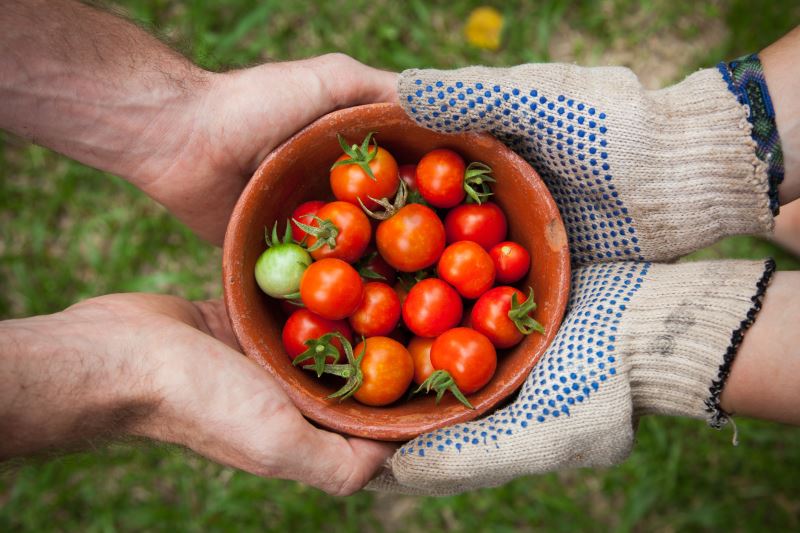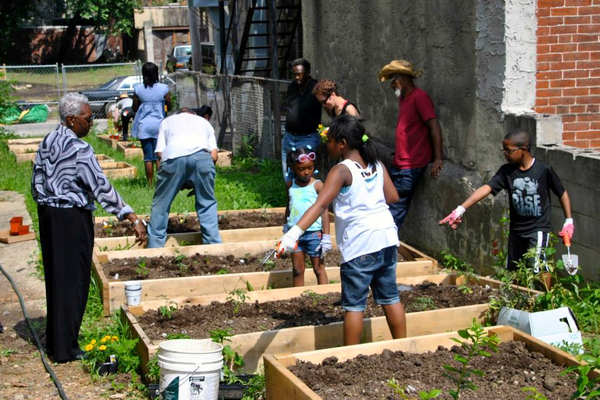Become a Sponsor
Help us help community gardens and farms towards a better, sustainable city. From pro-bono legal assistance to access to information and resources, our Garden Justice Legal Iniative has impacted a sizeable percentage of the entire City’s population.
Sponsorship
Why Support Community Gardens?
Community gardens provide reliable sources of healthy food and income, and they help communities revitalize and reclaim their neighborhoods. But even established sites of urban food production face legal difficulties that can make them difficult to sustain – not the least of which is the difficulty faced by community groups and individuals seeking to grow food on public and private vacant and abandoned property. We need your help to increase our impact.
Community Sponsor - $25,000
Help us ensure a sustainable platform by simply sponsoring us for a year. You will be given a sponsorship position on every page with your logo and a link to your organization’s website.
Single Event Sponsor - $2,500
Help us provide the community with a hands-on training workshop.
Get In Touch
If you'd like to sponsor us today, simply drop us a line.
Alternatively, you can donate directly to the Public Interest Law Center here.
Philly’s Resource Ecosystem
We help transform vacant land
From success stories like One Community Art Center, to the more than 140 other gardens and community centers started
140+ Vacant Lots Transformed
We help communities secure their future
We ensure that community farmers and gardeners in Philadelphia have the resources and tools they need to preserve their space, support self advocacy, and informed leadership to effect equitable and meaningful reforms needed for community land and food security and sovereignty at the neighborhood, city, and state levels
1000+ Assisted
We provide immediate, high-impact pathways and resources
From pro-bono legal assistance to information and resources that have since 2013 impacted a sizeable percentage of the entire City’s population.
160,000+ Visitors
OUR HISTORY
In 2011, the Public Interest Law Center launched the Garden Justice Legal Initiative (GJLI) with support from the Skadden Fellowship Foundation. The goal of the project is to provide pro bono legal support, policy research and advocacy, and community education to community gardeners and market farmers in the Philadelphia region. Through GJLI, we provide direct representation to clients. The GJLI also connects community gardens with pro bono counsel to expand capacity and increase representation of gardens. Through community education, we engage with more than 200 people each year, providing tools to advocate for the right to use and build community on land in their neighborhoods.
GrounDed In Philly - In the News
- Philly names first-ever farm czar – WHYY, April 24, 2019
- Neighborhood gardens grow community as much as food. Now there is online tool to help– Generocity, April 15, 2019
- How Grounded in Philly is Making Vacant Lots Accessible to the Public– Generocity, February 16, 2015
- Grounded in Philly: Interactive map of 32k+ vacant lots – Technically Philly, July 2, 2013
- Two Awesome New Resources for Philly’s Urban Gardeners – Philadelphia Magazine’s Be Well Philly, June 27, 2013
- Website Connects Interested Parties with Vacant Lots – KYW Radio/CBS Philly, June 26, 2013
- Residents Get New Tools to Help Vacant Lots Become Productive – Weekly Press, June 26, 2013
- New website helps gardeners secure vacant land – Plan Philly, June 26, 2013
- Putting Vacant Land on the Map: A Tech Tool to Solve Philly’s Blight Problem – Citypaper, June 25, 2013
- Web tool aims to help Philly residents rescue blighted lots – Newsworks, June 24, 2013
- Powerful App, New Coalition to Turn Vacant Lots into Green Spaces – Grid Magazine, June 20, 2013
Current Enviornmental Cases & Projects
New Jerusalem, located on the west side of North Philadelphia, is a residential addiction recovery community run by Medical Mission Sisters. In the 1990s, the non-denominational organization took over vacant lots and turned them into fruit and vegetable gardens. The gardens serve as a local and fresh food source for the community as well as..
PHILLY HEALTHY SCHOOLS INITIATIVE
The average age of the School District of Philadelphia’s public school facilities is over 66 years, and decades of under-investment has resulted in nearly $5 billion of deferred maintenance, repairs, and replacement needs. As a result, students, teachers and staff have been exposed to lead in paint and drinking water, asbestos, mold, rodent and pest infestations, and lack of proper climate control.
EASTWICK ADVOCACY AND COMMUNITY DEVELOPMENT
Eastwick is a neighborhood in southwest Philadelphia. In the 1950s, the Philadelphia Redevelopment Authority condemned and seized more than 2,500 acres of land in Eastwick by eminent domain.
GARDEN JUSTICE LEGAL INITIATIVE (GJLI)
In 2011, the Public Interest Law Center launched the Garden Justice Legal Initiative (GJLI) with support from the Skadden Fellowship Foundation.
Grounded in Philly – www.groundedinphilly.org – started as a web mapping and organizing tool that provides access to data on vacant land throughout Philadelphia and it offers resources to individuals interested in starting or preserving community-based vacant land projects.
Through the advocacy of the Garden Justice Legal Initiative and its partners, Philadelphia City Council unanimously approved a Philadelphia Land Bank bill designed to provide a transparent, streamlined and equitable process through which the city can manage the more than 40,000 vacant properties and support a range of development and community-driven productive uses.
HAWTHORNE EMPOWERMENT COALITION ZONING RELIEF
A 32-story mixed use development was proposed by Tower Development and developer Bart Blatstein in the Hawthorne Neighborhood in South Philadelphia. Like many non-affluent neighborhoods, the community was not consulted and its desires were disregarded in this process.
Past Environmental Cases & Projects
New Jerusalem, located on the west side of North Philadelphia, is a residential addiction recovery community run by Medical Mission Sisters. In the 1990s, the non-denominational organization took over vacant lots and turned them into fruit and vegetable gardens. The gardens serve as a local and fresh food source for the community as well as..
PHILLY HEALTHY SCHOOLS INITIATIVE
The average age of the School District of Philadelphia’s public school facilities is over 66 years, and decades of under-investment has resulted in nearly $5 billion of deferred maintenance, repairs, and replacement needs. As a result, students, teachers and staff have been exposed to lead in paint and drinking water, asbestos, mold, rodent and pest infestations, and lack of proper climate control.
EASTWICK ADVOCACY AND COMMUNITY DEVELOPMENT
Eastwick is a neighborhood in southwest Philadelphia. In the 1950s, the Philadelphia Redevelopment Authority condemned and seized more than 2,500 acres of land in Eastwick by eminent domain.
GARDEN JUSTICE LEGAL INITIATIVE (GJLI)
In 2011, the Public Interest Law Center launched the Garden Justice Legal Initiative (GJLI) with support from the Skadden Fellowship Foundation.
Grounded in Philly – www.groundedinphilly.org – started as a web mapping and organizing tool that provides access to data on vacant land throughout Philadelphia and it offers resources to individuals interested in starting or preserving community-based vacant land projects.
Through the advocacy of the Garden Justice Legal Initiative and its partners, Philadelphia City Council unanimously approved a Philadelphia Land Bank bill designed to provide a transparent, streamlined and equitable process through which the city can manage the more than 40,000 vacant properties and support a range of development and community-driven productive uses.
HAWTHORNE EMPOWERMENT COALITION ZONING RELIEF
A 32-story mixed use development was proposed by Tower Development and developer Bart Blatstein in the Hawthorne Neighborhood in South Philadelphia. Like many non-affluent neighborhoods, the community was not consulted and its desires were disregarded in this process.
PAST ENVIRONMENTAL CASES & PROJECTS
Community gardeners in South Kensington claim right to land they have stewarded for 29 years by adverse possession. Members of the Philadelphia Catholic Worker, a longstanding South Kensington community-based organization, filed litigation in order to establish its ownership and gain.
SAVE US FROM FUTURE ENVIRONMENTAL RISKS (SUFFER)
In Hazelton, Pa., a developer was given a permit to fill a contaminated and abandoned mine site with over 2 million tons of unstudied waste material. Starting in 2010, the Law Center represented Save Us From Future Environmental Risks (SUFFER), a community group of concerned Hazleton citizens fighting to protect the environmental health of their community.
Hunting Park, a low-income, largely minority neighborhood in North Philadelphia, has long been home to a disproportionate number of polluters. The Law Center first partnered with Hunting Park residents in 1986 when a company planned to open a facility to treat toxic wastes in the middle of the neighborhood. We provided legal and technical assistance, and we helped the community secure additional safeguards and citizen oversight of the facility’s emissions.
WASTE INCINERATOR IN HARRISBURG
Since the 1970s, the predominantly minority community in Harrisburg, Pa., has housed the municipal incinerator that serves the entire largely white county around Harrisburg. The incinerator, closed in 2002, for years emitted dioxins at a rate 150 times higher than other incinerators in the state.
DISCRIMINATORY ENVIRONMENTAL PERMITTING IN CAMDEN, N.J.
Like the City of Chester in Pennsylvania and many other low-income, minority communities, Camden, New Jersey contains a huge number of high-level polluters. The 90%-minority city is home to a regional incinerator, a regional sewage treatment plant, and multiple Superfund sites.
LARGE-SCALE POLLUTERS IN PHILADELPHIA
Beginning in 1978, the Law Center represented neighborhoods throughout the Philadelphia metropolitan area threatened by pollution.
ENVIRONMENTAL RACISM IN CHESTER
Chester, Pennsylvania is a small city with a low-income African American population, located in the affluent, mostly white Delaware County – and it is the site of an unprecedented cluster of industrial polluting facilities. Chester has been home to a trash incinerator that handled waste from the entire county, a sewage treatment plant that still receives the entire county’s sewage, and numerous other waste processing plants, oil refineries, and industrial polluters. Essentially, the low-income, black community of Chester has been forced to live amidst the waste of the more affluent, white towns and cities around it.
For many years, environmental risks in our workplaces and our communities were kept secret, often revealed only in cases of catastrophes that caused irreparable harm to workers or community members.
In the early 1970s, Pennsylvania’s smog problem was among the worst in the country. The U.S. Environmental Protection Agency (EPA) created a plan in response Pennsylvania to create plans to reduce pollution in and around Philadelphia and Pittsburgh, the most important element of which was the adoption of a motor vehicle emissions program that included mandatory inspections and maintenance. The state openly refused to implement the plan.
More About Us
Grounded In Philly
Grounded in Philly helps communities turn vacant land into community-controlled green spaces, gardens and gathering places. By using public data sources, residents will be able to determine who owns a lot, whether the lot has debt or is about to be developed, and other information. And by answering simple questions, you can find the resources you need using our pathways tool. Through this site you can connect and communicate with other residents in our Grapevine forum. You’ll also find links to a variety of organizations in Philadelphia dedicated to preserving community green space, as well as links other resources..
The Garden Justice Legal Initiative at the Public Interest Law Center and 596 Acres in Brooklyn, NY came together in late 2012 to start developing Grounded in Philly and collaborate on making vacant space available to communities in Philadelphia.
Now, with a new and interactive design donated by Key Medium for 2019, Grounded in Philly is a one-stop online hub for community green space in Philadelphia. Whether you hope to start a garden, preserve existing green space, or participate as a volunteer at a garden in your neighborhood, you can connect to the resources you need. And you don’t need to go it alone–come together with your neighbors and read stories of community success in our Grapevine forum.
The Public Interest Law Center's Garden Justice Legal Initiative
The Garden Justice Legal Initiative (GJLI) provides pro bono legal support, advocacy, and policy research to community gardens and urban farmers in Philadelphia’s communities of color, immigrant and refugee communities, and historically disinvested neighborhoods. The project began in 2011 at the Public Interest Law Center with support from the Skadden Fellowship program.
GJLI engages community members, develops partnerships with nonprofit and community-based organizations, and fosters relationships between community gardeners and municipal authorities to help foster a movement in Philadelphia to support food access and positive vacant land policies. We aim to give communities greater control over the future of their neighborhoods. Grounded in Philly is one of the awesome ways we’re reaching that goal.
596 Acres: 596 Acres built online organizing platforms for land access advocates and facilitators and acted locally in Brooklyn, NY as an advocate and a facilitator. They helped build the first version of the site, which helped many community members protect and establish community green space from 2013 to 2018.






